
Eliza Rosanna Gilbert, Countess of Landsfeld, better known by the stage name Lola Montez, was an Irish dancer and actress who became famous as a Spanish dancer, courtesan, and mistress of King Ludwig I of Bavaria, who made her Gräfin von Landsfeld. At the start of the Revolutions of 1848 in the German states, she was forced to flee. She proceeded to the United States via Austria, Switzerland, France and London, to return to her work as an entertainer and lecturer.
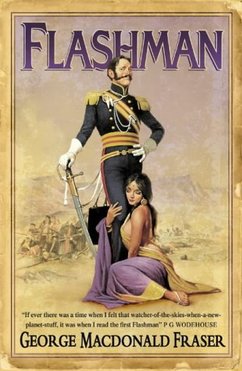
Sir Harry Paget Flashman is a fictional character created by Thomas Hughes (1822–1896) in the semi-autobiographical Tom Brown's School Days (1857) and later developed by George MacDonald Fraser (1925–2008). Harry Flashman appears in a series of 12 of Fraser's books, collectively known as The Flashman Papers, with covers illustrated by Arthur Barbosa and Gino D’Achille. Flashman was played by Malcolm McDowell in the Richard Lester 1975 film Royal Flash.

The Prisoner of Zenda is an 1894 adventure novel by Anthony Hope, in which the King of Ruritania is drugged on the eve of his coronation and thus is unable to attend the ceremony. Political forces within the realm are such that, in order for the king to retain the crown, his coronation must proceed. Fortuitously, an English gentleman on holiday in Ruritania who resembles the monarch is persuaded to act as his political decoy in an effort to save the unstable political situation of the interregnum.
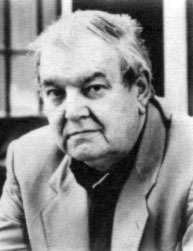
George MacDonald Fraser was a Scottish author and screenwriter. He is best known for a series of works that featured the character Flashman. Over the course of his career he wrote eleven novels and one short-story collection in the Flashman series of novels, as well as non-fiction, short stories, novels and screenplays—including those for the James Bond film Octopussy, The Three Musketeers and an adaptation of his own novel Royal Flash.
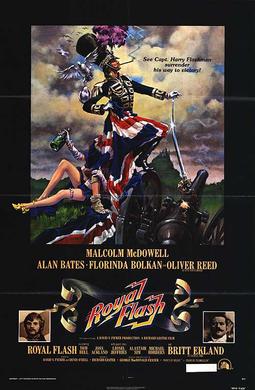
Royal Flash is a 1975 British adventure comedy film based on the second Flashman novel by George MacDonald Fraser. It stars Malcolm McDowell as Flashman. Additionally, Oliver Reed appeared in the role of Otto von Bismarck, Alan Bates as Rudi von Sternberg, and Florinda Bolkan played Lola Montez. Fraser wrote the screenplay and the film was directed by Richard Lester.
The sport of cricket has long held a special place in Anglophone culture, and a specialised niche in English literature. Cricket is the official summer sport in England, and it is widely known as the "gentleman's game", owing to the unique culture of the sport and its emphasis on ideals such as grace, sportsmanship, character and complexity. Cricket has therefore often attracted the attention of the literati – Lamb, Hazlitt and Leigh Hunt were all players of the game – and some of the greatest English writers have written about cricket. This was particularly true in the era before the Second World War, for example, during the Edwardian era, and in the 1920s and 1930s.

Flashman is a 1969 novel by George MacDonald Fraser. It is the first of the Flashman novels.
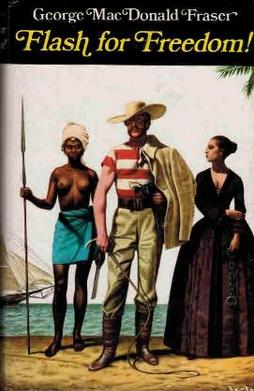
Flash for Freedom! is a 1971 novel by George MacDonald Fraser. It is the third of the Flashman novels.

Flashman at the Charge is a 1973 novel by George MacDonald Fraser. It is the fourth of the Flashman novels. Playboy magazine serialised Flashman at the Charge in 1973 in their April, May and June issues. The serialisation is unabridged, including most of the notes and appendixes, and features a few illustrations, collages from various paintings and pictures to depict a period montage of the Charge and Crimea.

Flashman and the Redskins is a 1982 novel by George MacDonald Fraser. It is the seventh of the Flashman novels.

Flashman and the Dragon is a 1985 novel by George MacDonald Fraser. It is the eighth of the Flashman novels.
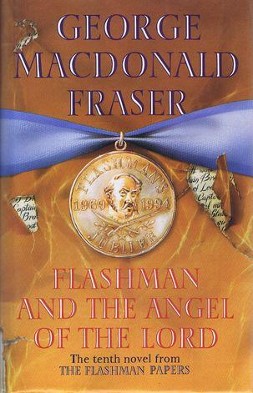
Flashman and the Angel of the Lord is a 1994 novel by George MacDonald Fraser. It is the tenth of the Flashman novels.

Flashman and the Tiger is a 1999 book by George MacDonald Fraser. It is the eleventh of the Flashman books.
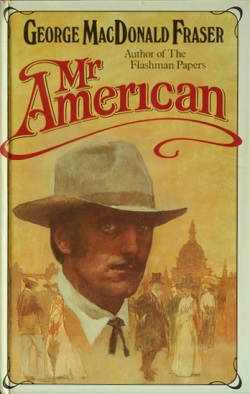
Mr American is a 1980 novel by George MacDonald Fraser, who described it as longer and more "conventional" than his usual work.
Fenwick "Fenny" Travers is a fictional character and antihero created by Raymond M. Saunders. The character was inspired by the character of Harry Flashman in a series of historical novels written by George MacDonald Fraser, but the character of Travers did not become as successful as his British counterpart.
Flashman or Flash Man may refer to:

Black Ajax is a historical novel by George MacDonald Fraser based on the career of Tom Molineaux. It is set during the Regency era. The father of Harry Flashman appears as a major character although the book is not part of the official Flashman series.

The Candlemass Road is a historical novel from George MacDonald Fraser set in the time of the Border Reivers, a period Fraser had earlier written about in The Steel Bonnets and would later return to in The Reavers.
The Flashman Papers is a series of novels and short stories written by George MacDonald Fraser, the first of which was published in 1969. The books centre on the exploits of the fictional protagonist Harry Flashman. He is a cowardly British soldier, rake and cad who is placed in a series of real historical incidents between 1839 and 1894. While the incidents and much of the detail in the novels have a factual background, Flashman's actions in the stories are either fictional, or Fraser uses the actions of unidentified individuals and assigns them to Flashman. Flashman is a character in the 1857 novel by Thomas Hughes, Tom Brown's School Days; Hughes' version of the character is a bully at Rugby School who is expelled for drunkenness. The character was then developed by Fraser, and appeared in the 1969 novel Flashman. Fraser went on to write a total of eleven novels and one collection of short stories featuring the character.
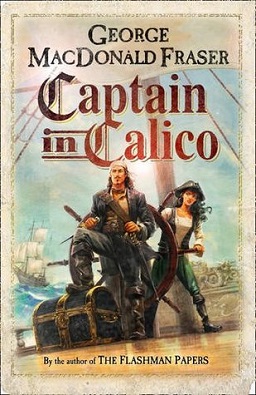
Captain in Calico is a 2015 novel by George MacDonald Fraser. It was published seven years after his death in 2008 and is about the pirate Jack Rackham. Mary Read and Anne Bonny also appear as characters in this novel.
















